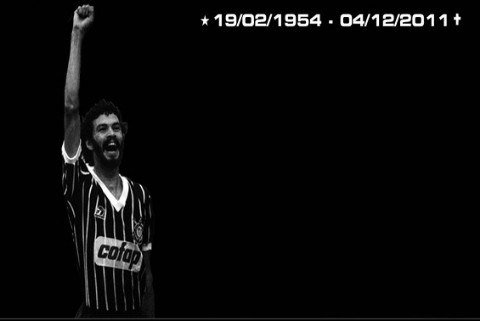To mark the passing of Brazilian football legend and political activist Sócrates, we have translated this article from the blog of Esquerda Marxista, the Marxist tendency of the Workers Party (PT) in Brazil
 Sports heroes increasingly have their images cut out to be sold as good guys, humble people who like children and animals. They are actually converted into tasteless, odorless and colorless substances. After all, being a good product to sell is the function of a commodity in the capitalist system, and a commodity is not supposed to express opinions, and especially convictions. The late Socrates, who died on Sunday, December 4th, was the opposite of this, he was genuine and intelligent, he was bold, he was revolutionary.
Sports heroes increasingly have their images cut out to be sold as good guys, humble people who like children and animals. They are actually converted into tasteless, odorless and colorless substances. After all, being a good product to sell is the function of a commodity in the capitalist system, and a commodity is not supposed to express opinions, and especially convictions. The late Socrates, who died on Sunday, December 4th, was the opposite of this, he was genuine and intelligent, he was bold, he was revolutionary.
The working class has had many distinguished friends, people who gained fame for their sports or artistic skills, etc.. They used the visibility generated by their profession to stand out against the dominant ideology and the ruling class, standing on the side of workers in specific battles.
Dr. Socrates was one of those. He called himself a socialist, a defender of the revolution. His humble origins in Pará showed him that the world is not fair, but he learnt that through struggle the world may indeed become more fair and democratic.
A member of the Workers Party (PT), Socrates participated actively in the campaign for "Direct Elections Now" for president of the republic in the 80's [against the military dictatorship]. He also played a key role in the Corinthians Democracy movement, together with other players like Wladimir and Casagrande and football director Adilson Monteiro Alves, who put into practice a system in which the collective (players, technical staff, etc), had greater power in the decision making process in the Corinthians football club. Votes were taken to decide issues such as squad line up, the concentration rules, the concentration venues, the hiring of players, bonuses and wages for the team, among other things. All were entitled to vote and there was no distinction or greater weight for anyone, regardless of the position held, be that a main player, a reserve or support staff (from the directors to the wardrobe attendants, all voted with equal weight in decisions).
Within the context of the military dictatorship that the country was under, such a move was a clear challenge to the political regime. Just remember that the first direct election for governor took place in Sao Paulo in 1982, just one year after the start of the Corinthians Democracy. The experience was so successful that, in addition to winning twice the Sao Paulo championship, Corinthians paid off the debt inherited from the previous administration and had a positive balance in the accounts. This is without even having to sell advertising space on their kits, which were replaced by political slogans as "Direct Elections Now" and "I want to Vote for President." At that Socrates featured in rallies and meetings in favour of direct elections, with the backing of his team mates, showing the peculiar situation that the team was living at the time, the general politicization of society and the state of political consciousness of the group, since the organization and especially the actions taken to change social relations are never the work of one individual, however brilliant he may seem, but the result of collective action.
Socrates would celebrate his goals with a raised arm and clenched fist, a gesture that reminds us of the Communist salute and that reminds us of another instance of protest in the sport when two American athletes, Tommie Smith and John Carlos, in the 1968 Mexico Olympics, climbed the podium to receive their medals and an extended their arms with a clenched fist and a black glove, the salute of the Black Panthers. Like them, other athletes, such as the Brazilian player Reinaldo from the Atletico do MG, and Portuguese Eusebio, also known as "Black Panther", adopted the celebration of their goals with a closed fist, using a time of sporting celebration for an expression of political solidarity with the workers and oppressed of the world.
Socrates openly declared himself to be a supporter of the Cuban Revolution and the Venezuelan Revolution. He even named his youngest son after Fidel, he said that was the only son whose name he chose
We could not help but remember his genius with the ball. He was also smart his profession on the pitch. He was an elegant player, with efficient passing, becoming famous for his back-heel. His leadership skills coupled with the performance as a player led him to the status of captain in the team which played the World Cup in 1982, a team coached by the great Tele Santana which captivated the world with their football art, while not winning the title.
We bring this tribute to Socrates, a unique figure that leaves lessons and one that will be missed. This tribute to Socrates, is also a tribute and recognition of the practical experience that was the Corinthians Democracy and its historical significance, which goes beyond football.
before the Corinthians vs Palmeiras game on December 4th, players and supporters observe a minute's silence for Socrates and replicate his clenched fist salute
